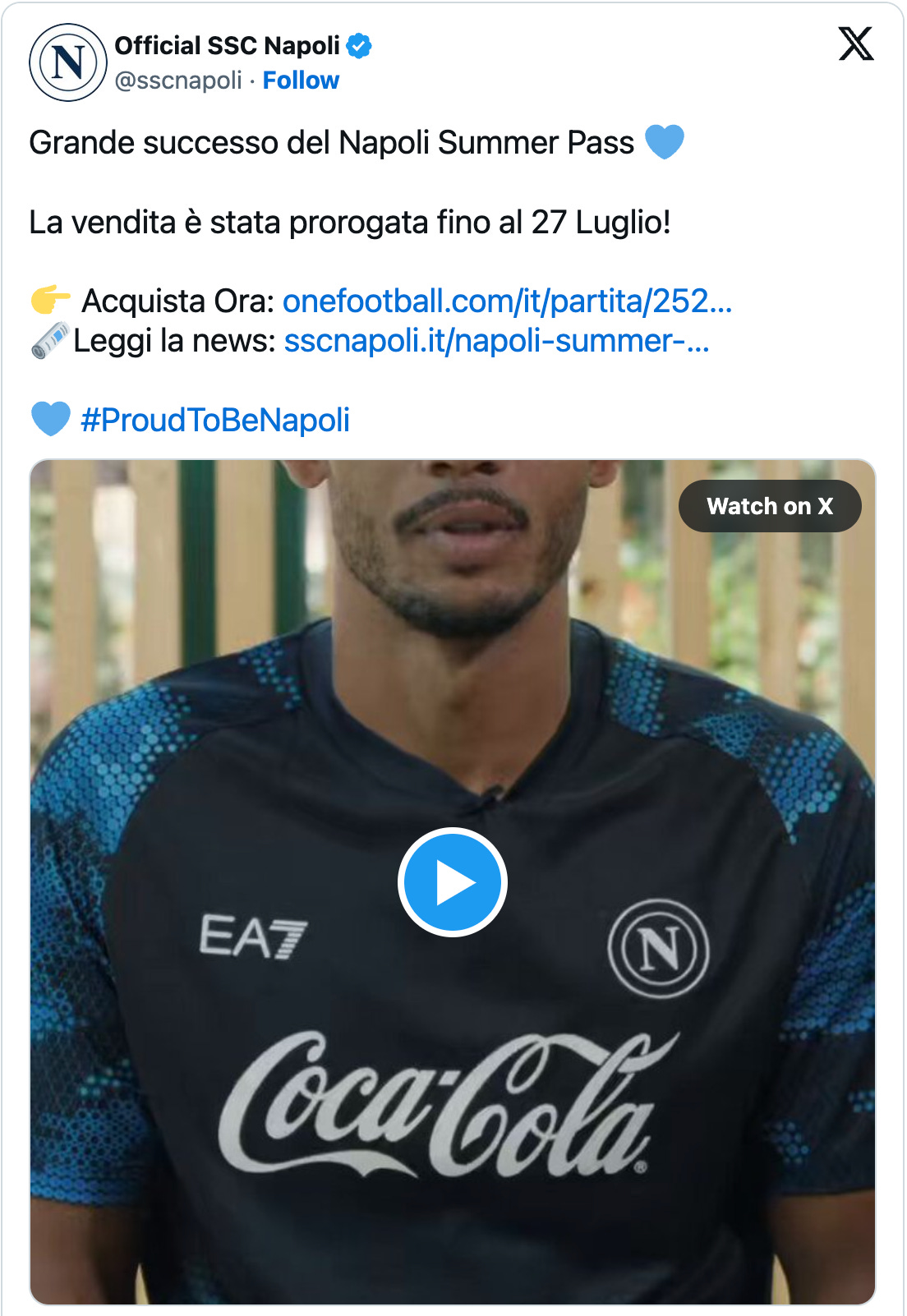Match Fit: How Napoli’s Pre-Season Pass Helped OneFootball Score Serie A UK Streaming Deal 📺
Heading into this season, OneFootball partnered with Serie A to stream eight out of ten matches per matchday—an achievement driven, in part, by the success of Napoli’s pre-season tour on the platform
Not yet a subscriber? Join over 3,000 sports business leaders, from Formula 1 to the Premier League, that read Sports Pundit every week to get impactful industry insights.
BIG IDEA
It wasn’t just the Napoli players being put through their paces ahead of the new season; OneFootball was testing its own capabilities, too.
As Napoli trained in the Alpine sunshine, the platform introduced the Napoli Summer Pass, offering fans access to five pre-season friendlies, press conferences, and behind-the-scenes content. It was a relatively small experiment, but it worked. Fans connected with their team in a way that felt tailored and intimate, and for Serie A, it was the proof they needed to try something bigger.
Heading into this season, OneFootball announced a partnership with the Italian top flight to stream eight out of ten matches per matchday exclusively in the UK, with the remaining two shared with TNT Sports. Fans can buy matches individually or opt for season-long League Passes (£99) or Team Passes (£79).
The deal represents a rethink of how international rights could work in a world where traditional models are breaking down.
The challenge facing leagues like Serie A is clear. In most international markets, the old ways of selling broadcast rights are no longer enough. Pay-TV providers, long the backbone of global distribution, are becoming more selective. Secondary rights, particularly for international audiences, no longer command the fees they once did. Meanwhile, fans are juggling multiple subscriptions, often finding it hard to justify yet another service. This creates a dilemma: how do you reach fans without alienating them with extra costs or undervaluing your product?
The instinct for some leagues is to turn to YouTube. It’s simple, free, and guarantees reach. However, Maurits Schön, OneFootball’s COO and Managing Director, explained that while it might attract large audiences, YouTube offers little in the way of customisation or control.
“What we are offering our partners is basically plug-and-play in the exact market where they want to activate a certain right. We give them a toolbox, and they can choose where they want to show which kind of content and how they want to monetise it. I don't think you have that ability on YouTube,” explained Schön.
“We are able to address the user directly and help them with discovery, ensuring that users who follow a certain interest will find content that’s relevant to them.”
For leagues with global aspirations, another option is to build their own streaming platform.
This might sound ideal—full control, full ownership—but it’s an enormous lift. Creating an OTT platform is expensive, but the real challenge is marketing. Even if you build something great, getting fans to adopt a new platform is hard. Without significant investment to drive awareness, your shiny new service risks becoming a ghost town. For most leagues, this path is unrealistic.
OneFootball offers a different approach, sitting between the old model of pay-TV and the dream of going fully direct-to-consumer.
It’s not a one-size-fits-all model; instead, leagues can tailor their offering to suit local preferences. In Germany, for instance, OneFootball holds non-exclusive rights to Bundesliga 2 and 3. Fans can watch via Sky or Magenta, respectively, or purchase matches on a pay-per-view basis from the platform.
“We collaborate very closely with our partners, like Magenta, Sky, but also DAZN, to create an offering that is really appealing to every user,” Schön said.
“Ultimately, what we don’t want is to miss out on users or lose them to piracy because there’s no offering tailored to their needs, which might be just watching those two away games a month and then having a pay-per-view offering for three to five euros is a very attractive and appealing solution for them.”
For fans, the experience is seamless. OneFootball already exists as a hub for football content, and adding live matches to the mix feels natural. The platform has already accumulated highlights for numerous leagues, as well as shoulder programming.
For leagues, the benefits extend beyond distribution—it’s also about data.
OneFootball knows which teams fans follow, which players they care about, and how they engage with content. That data isn’t just about optimising the viewing experience; it’s a gateway to new revenue streams. Imagine sending a Napoli fan who has watched every minute of the Summer Pass a push notification for a limited-edition jersey drop or exclusive behind-the-scenes footage. That kind of precision isn’t yet possible on YouTube or with a generic broadcaster.
For Serie A, the decision to partner with OneFootball wasn’t about abandoning traditional broadcasters. It is about evolution rather than revolution.
A partnership like this allows leagues to retain control, connect with fans in meaningful ways, and explore new monetisation opportunities without the overhead of building something from scratch. It’s a model that recognises the shifting dynamics of international media rights and offers a way forward without a need to tear it all up.
This isn’t just a solution for Serie A. It’s a potential blueprint for any league navigating the complexities of today’s broadcast landscape.
THE PODCAST
Want to hear more from my conversation with Maurits?
We discuss the challenges with club apps, partnering with Apple and the MLS, building a loyalty rewards program, having a non-exclusive and incremental approach to content and rights partnerships, why a rightsholder might publish on OneFootball rather than on YouTube, having a team within Toni Kroos’ Icon League, launching a commerce functionality on the app, and much much more.
Listen to the full podcast via the link below - and I’d love to hear what you think! 👇
Not yet a subscriber? Join over 3,000 sports business leaders, from Formula 1 to the Premier League, that read Sports Pundit every week to get impactful industry insights.










Great post!